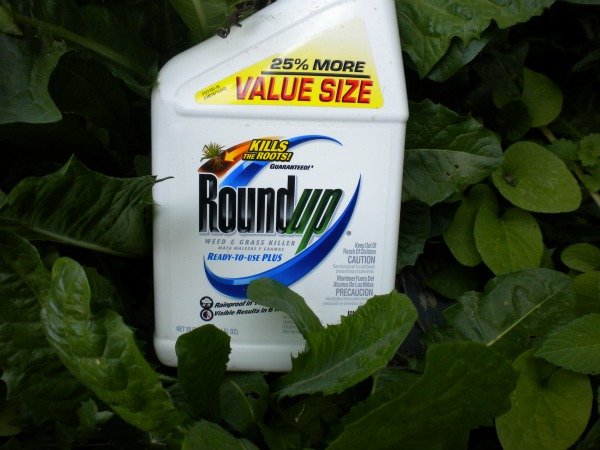
You’ve seen the commercials. All American Dad, pump sprayer in hand, attacking those pesky weeds growing in the cracks of his family’s driveway with a vengeance. He chooses Roundup, of course.
Why? Because Roundup kills weeds to the root so they won’t come back making you the laughingstock of your suburban neighborhood.
Roundup, Roundup everywhere. Most homeowners use it without a second thought. Many schools even use it, blithely spraying around planting beds and sidewalks where children walk and play, tracking its residues into classrooms, cars, homes and little bodies.
Roundup is indisputably the King of Herbicides and one of Monsanto’s most lucrative crown jewels. Not only is it widely used by consumers, it is also heavily used by industrial agriculture – more popular than any other herbicide worldwide. Its residues are found on the staple crops of the Western diet – sugar, corn, soy and wheat – and in the plethora of processed foods made with these foods as well. In particular, GMO corn and soy are heavily doused in Roundup as these crops are genetically engineered to be immune to its withering effects.
The trouble is, while Roundup is highly effective at killing weeds, it’s also proving highly effective at killing us too – slowly but surely and insidiously – via Roundup’s deadly active ingredient – glyphosate.
While the pesticide industry maintains that glyphosate is minimally toxic to humans, new research published in the Journal Entropy strongly argues otherwise by shedding light on exactly how glyphosate disrupts mammalian physiology.
Authored by Anthony Samsel and Stephanie Seneff of MIT, the paper investigates glyphosate’s inhibition of cytochrome P450 (CYP) enzymes, an overlooked component of lethal toxicity to mammals.
In the in-depth video interview below on her groundbreaking research, Dr. Seneff describes the mechanism by which the glyphosate in Roundup disrupts human biological processes.
The currently accepted view is that glyphosate is not harmful to humans or any mammals because the shikimate pathway found in plants is absent in animals. The shikimate pathway is involved with the plant’s synthesis of certain amino acids and is lethally disrupted by glyphosate.
What has been completely overlooked until now is that the shikimate pathway is present in beneficial gut bacteria, which play a critical role in human health. Gut bacteria aid digestion, prevent permeability of the gastrointestinal tract, synthesize vitamins and provide the foundation for robust immunity.
Glyphosate Disrupts the Functioning of Beneficial Gut Bacteria
In synergy with disruption of the biosynthesis of important amino acids via the shikimate pathway, glyphosate inhibits the cytochrome P450 (CYP) enzymes produced by the gut microbiome. CYP enzymes are critical to human biology because they detoxify the multitude of foreign chemical compounds, xenobiotics, that we are exposed to in our modern environment today.
As a result, humans exposed to glyphosate through the use of Roundup in their community or through the ingestion of its residues on industrialized food products become even more vulnerable to the damaging effects of other chemicals and environmental toxins they encounter!
What’s worse is that the negative impact of glyphosate exposure is slow and insidious over months and years as inflammation gradually gains a foothold in the cellular systems of the body.
The consequences of this systemic inflammation are most of the diseases and conditions associated with the Western lifestyle:
- Gastrointestinal disorders
- Obesity
- Diabetes
- Heart Disease
- Depression
- Autism
- Infertility
- Cancer
- Multiple Sclerosis
- Alzheimer’s disease
- And the list goes on and on and on …
In summary, Dr. Seneff’s study of Roundup’s ghastly glyphosate uncovers the manner in which this lethal environmental toxin gradually and inevitably disrupts homeostasis in the human body with the tragic end result of disease, degeneration, and widespread suffering.
Still want to “shoot” those weeds this weekend with some Roundup and buy those unlabeled, GMO laced processed foods in the pretty packages at the supermarket?
In addition, Roundup residue in organic hydroponics is possible as there is no transition period from conventional farming. Stick with soil based organics!
References
Glyphosate’s Suppression of Cytochrome P450 Enzymes and Amino Acid Biosynthesis by the Gut Microbiome: Pathways to Modern Diseases
Institute of Responsible Technology: Monsanto’s Herbicide–Featuring the Darth Vader Chemical
More Toxic Than Declared
More Information
Toxic Wheat
Glyphosate used on DOZENS of Food Crops
Dutch Ban Glyphosate, France and Brazil Likely to Soon Follow








get informed…
I would rather look at the weeds than use round up. Seriously people sop using that poison. You are poisoning everyone else so your yard can be thistle free?
Rebekah,
I just posted a blog about using vinegar to kill weeds. Check it out.
Hey, great information. Have you connected with Nutrilite the multi-supplement arm of Amway? They do much research is what I have heard.
just a shot in the dark .. and just a wondering thought . . Amy Sue Lee wonder if this is what’s behind the slew of severe birth defects in WA state ? babies being born without brains ? could be lots of things but its def a good time to bring light to the things we’d never realize . . or what we take for granted . .
If that’s true, then NO ONE is growing organically, right? We’re all using Roundup wether we like it or not 🙁
Well said,reposting.
Spray vinegar in the morning let the sun shine on them all day and the weeds die. Even thistle.
So I was watching an article about being “cheep” and a guy was using boiled pasta water on his weeds. He said it did not ruin the grass. He drained the pot directly into the weed/thistle patches and on the sidewalk cracks . He used all boiled water from veggies to pasta . I haven’t tried it because I gave up pasta a month ago.
Vinegar and salt kill weeds. But will also kill your grass.
I usually just pull the weeds.